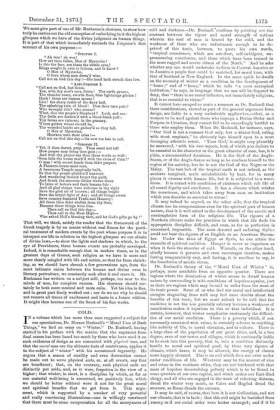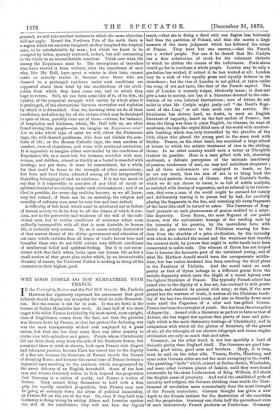COLD.
IN a volume which has more than once suggested a subject for our speculations, Dr. Horace Bushnell's "Moral Uses of Dark Things," we find an essay on "Winter." Dr. Bushnell, having started in his preface with the maxim that the argument from final causes has been based too much by those who have used it on such evidences of design as are connected with physical uses, and that the moral-uses are the ultimate tests of contrivance, applies it to the subject of " winter " with his accustomed ingenuity. He argues that a season of sterility and even destruction cannot be made out to serve physical ends, or, at all events, any that are beneficent ; that, on the contrary, such physical ends are distinctly put aside, and, as it were, forgotten in the view of a higher; that winter, in short, is a discipline by which, as far as our material well-being is concerned, we positively lose, which we should be better without were it not for the great moral and spiritual benefits that we get from it. This argu- ment, which is supported by a number of very powerful and really convincing illustrations—one is willingly convinced that there must be some compensation for all the annoyances of cold and darkness—Dr. Bushnell .confirms by pointing out the contrast between the vigour and moral strength of nations wherein the soul of man is braced by the cold, and the weakness of those who are unfortunate enough to be de- prived of this tonic, between, to quote his own words,
"tropical consciences, which are out-door, self-indulgent, ton-
pronouncing consciences, and those which have been trained in the more rugged and severe climes of the North." 'And he asks
whether any one would undertake to form in Central America or in Jamaica a people that could be matched, for moral tone, with that of Scotland or New England. In the same spirit he dwells on the necessity of winter as a condition in the development of "home ;" and of "home," which he calls "a most untropical institution," he says, in language that no one will be disposed to deny, that "there is no moral influence, not immediately religious, that is so essential to virtue."
It cannot have escaped so acute a reasoner as Dr. Bushnell that these considerations, viewed as part of the general argument from. design, are liable to a very undesirable application,—that, as a weapon to be used against those who impugn a Divine Order and Purpose in Creation, they cannot fail to be exceedingly hurtful to those who employ them. When Dr. Bushnell, for instance, says, "Our God is not a summer God only, but a winter God, ruling with stout emphasis," he obviously lays himself open to a most damaging atheistic retort. 'Your God,' it might very plausibly be answered, 'with his two aspects, both of which you declare to be essential to his character as the great educator of man, has, it is plain, a circumscribed dominion. He is the God of the Anglo- Saxon, or of the Anglo-Saxon so long as he confines himself to the region of his nativity, but he is not the God of the Negro or the Malay. The vast belt of the tropical earth is not indeed, as the ancients imagined, made uninhabitable by heat, for in many places it swarms with human life, but it is subjected to a worse doom. It is cursed with conditions of existence which rob life of all moral dignity and excellence. It has a climate which relates the conscience, and which takes away from man an institution which you describe as essential to virtue !
It may indeed be argued, on the other side, that the tropical climate has its compensations even for the spiritual part of human nature,- that it is well suited to the development of the ascetic and contemplative form of the religious life. The rigours of a Northern climate make the practices in which that life finds its appropriate discipline difficult, and even, as far as perfection is concerned, impossible. The most devoted and enduring Sty/iteg could not bear the rigours of an English or an American Decem- ber. Under the skies of Egypt or Syria, he can attain the summits of spiritual ambition. Hunger is never so imperious as when it feels the stimulus of cold. Warmth, on the other hand, chiefly because it permits and even encourages inaction, makes fasting comparatively easy, and fasting, it is needless to say, is the foundation of ascetic virtue.
Dr. Bushnell's theory of the "Moral Uses of Winter" is, perhaps, more assailable from an opposite quarter. There are regions where the domination of winter seems to dwarf human nature by surrounding it with conditions of hopeless squalor, just as there are regions which may be said to suffer from the want of its tonic power. Some of us who find our moral and intellectual energies stagnating from cold may feel some doubts about the benefits of this tonic, but we must submit to be told that the medicine is not the less generally salutary because a weakness of constitution makes it injurious to this or that individual. It is. certain, however, that winter complicates enormously the difficul- ties of our social condition. There is a poverty which, if not necessarily associated with crime, is certainly adverse to anything like nobility of life, to moral elevation, and to culture. There is a large class of the population of our great cities, and, in a less degree, even of our towns and villages, which is continually liable- to be sunk into this poverty, that is, into a condition distinctly hostile to moral and spiritual good, by these very rigours of climate, which brace, it may be allowed, the energy of classes mote happily situated. This is an evil which does not exist under easier conditions of life. Whatever may be the amount of vice and crime in the southern cities, they are not burdened with that mass of hopeless demoralizing poterty which is to be found in some quarters of our own capital, and which makes our East-End. clergy, and all who are engaged in the work of relieving distress, dread the winter very much, as Cairo and Bagdad dread the summer, as Rome dreads the autumn.
It may be said, of course, that here it is our civilization, and not our climate, that is in fault ; that this evil might be banished from among us if our social order were better arranged; and if it be
granted, we will take another instance to which the same objection will not apply. Round the Northern Pole of the earth there is a region which the ancients imagined, as they imagined the tropical zone, to be uninhabitable by man ; but which we know to be occupied by tribes, sparsely scattered, indeed, but still amounting in the whole to no inconsiderable numbers. Think now what life among the Esquimaux must be. The descriptions of travellers who have viewed it from without, even the experience of men who, like Mr. Hall, have spent a winter in their huts, cannot make us actually realize it, because even those who are doomed to a prolonged residence under such conditions are supported above their level by the recollections of the civili- zation from which they have come out, and to which they hope to return. Still, we can form some idea of it, of its dirt, its squalor, of the perpetual struggle with nature by which alone it is prolonged, of the alternations between starvation and repletion by which it is diversified. Can we, knowing what we do of these conditions, and allowing for all the virtues which may be developed in spite of them, possibly even out of them—virtues, for instance, of hospitality and kindness, which, Mr. Hall tells us, are often found among this people—can we imagine an Esquimaux saint ? Let us take which type of saint we will, either the Protestant type, the well-dressed gentleman, who does not disdain the com- forts of life ; or the Roman Catholic type, the man careless of comfort, even of cleanliness, and worn with continual austerities. It is impossible to imagine either surrounded by the conditions of Esquimaux life, in a snow-hut, for instance, crowded with men, women, and children, almost as thickly as a barrel is crowded with herrings, not put there, it must be remembered, for a while, for that could be borne in the strength of other associations ; but born and bred there, educated among all the inexpressibly degrading belongings of such an existence. It is not too much to say that it is impossible to conceive of any ideal of moral or spiritual character as existing under such circumstances ; and if no ideal is possible, the every-day realities become, as we all know, very low indeed ; if there can be no saintship, the religion and morality of ordinary men must be very low and base indeed.
A difficulty of this kind, which must be attributed not to failure of human society to do its duty to all the classes of which it con- sists, nor to the perversity and weakness of the will of the indi- vidual man, but to certain conditions of existence which seem radically incompatible with all that is most desirable in human life, is certainly very serious. To us it seems utterly destructive of that narrow theory of the divine government and education of our race, which excludes from all hopes of God's favour here and hereafter those who do not fulfil certain very difficult conditions of intellectual belief and spiritual feeling. But it is not incon- sistent with that faith which looks upon our human life as but a small section of that great plan under which, by an inconceivable diversity of means, the Universal Father is seeking to bring all his creatures to their highest good.



































 Previous page
Previous page